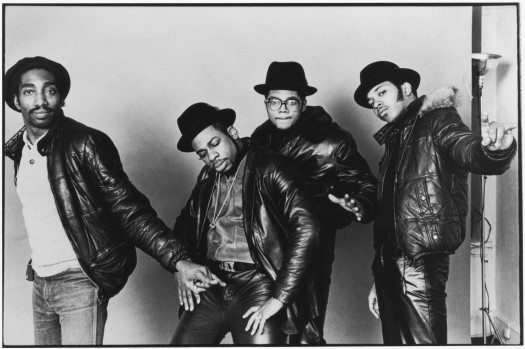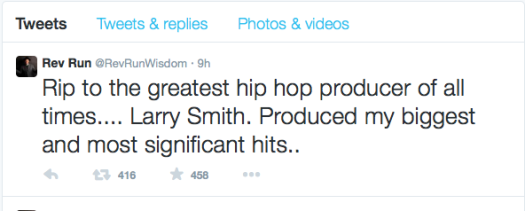
Tragedy struck in hip hop when radio personality Combat Jack posted to Twitter that iconic producer and instrumentalist Larry Smith died Thursday evening. The musical genius previously suffered a stroke in 2007, leaving him unable to speak and partially paralyzed.
In the early 1980s, Smith became one of hip hop’s first superproducers. He was instrumental in launching the careers of acts like Kurtis Blow, Run DMC and Whodini.
Born Lawrence Michael Smith in Queens, NY on Jun. 11, 1951, Smith was a self-taught bassist who became a session player for a slew of local bands spanning all musical genres. Thanks to his high school classmate, Robert Ford, Smith contributed the bass licks for Blow’s 1979 million-selling single “Christmas Rappin’.”
Almost immediately, the bassist co-wrote and played on Blow’s 1980 funky, gold-selling follow-up, “The Breaks,” which also cracked Billboard’s Top 100.
Eventually co-producing Blow’s first three full-length LPs, Smith became the bassist for Orange Krush, Blow’s back-up band. He connected with Blow’s then manager, Russell Simmons, to form Rush-Groove Productions.
Simmons’ and Smith’s partnership proved to be both lucrative and seminal to the advancement of hip hop culture. Smith was the architect behind Run DMC’s bare minimalist sound on both their self-titled 1984 debut album and 1985 sophomore effort, Kings of Rock.
Smith’s ear for raw and heavy snare loops led to the release of songs like “It’s Like That,” “Sucker MCs,” “Rock Box” and “Kings of Rock” going onto become instant classics for the trio. Smith, not Rick Rubin, was the first to integrate rock guitar into rap.
Run DMC earned gold and platinum plaques and became heavily rotated on MTV, which at the time didn’t play any hip hop videos. Joseph “Rev Run” Simmons tweeted that Smith is “the greatest hip hop producer of all-time.”
 Smith was never the type that subscribed to fit in with what was being played on the radio. He produced Whodini’s 1984 platinum-certified second album, Escape, as well as their third effort, Back in Black, proving he could be just as innovative, funky and melodic.
Smith was never the type that subscribed to fit in with what was being played on the radio. He produced Whodini’s 1984 platinum-certified second album, Escape, as well as their third effort, Back in Black, proving he could be just as innovative, funky and melodic.
The perfectionist producer pumped out memorable, electrofunk-based singles for the Brooklyn-born Jive Records artists like “Five Minutes of Funk,” “Freaks Come Out At Night,” “One Love” and “Friends.”
He contributed bass to the Fat Boys’ “Jail House Rap” and even produced late comedian Rodney Dangerfield’s novelty single, “Rappin’ Rodney.” He also produced for Con Funk Shun (“Electric Lady”), Millie Jackson (“It’s A Thang”) and Paul Shaffer (“Tear It On Down”).
http://youtu.be/A7nzf1yz7_g
Simmons and Rubin went on to build an incredible legacy with Def Jam, while Simmons’ relationship with Smith, who actually coined the term “Krush Groove” to denote a distinct beat from the drum machine, sadly soured.
As hip hop music became more sample-driven, Smith bowed out the game and eventually faded into obscurity. His health as a result of his debilitating stroke forced the musical visionary to be placed into a New York nursing home where he could barely afford proper care.
Despite his tragic fate, what is undeniable is what Smith was able to accomplish in the studio. He credited keeping his ear to the streets and respecting each and every individual’s lifestyle he worked with as the basic components for some of hip hop’s most important recordings.
Hip hop producers like DJ Premier credits Smith as one of his top five influences. The talented bassist’s cause of death is unknown. He was 63.
This post was written by Christopher A. Daniel, pop cultural critic and music editor for The Burton Wire. He is also a contributing writer for Urban Lux Magazine and Blues & Soul Magazine. Follow Christopher @Journalistorian on Twitter.
Like The Burton Wire on Facebook. Follow us on Twitter @TheBurtonWire.








